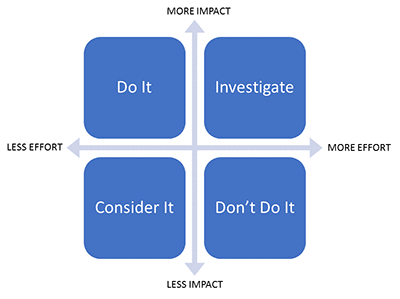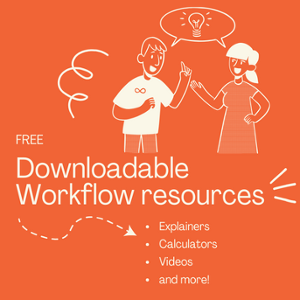How to Be (More) Productive During Unexpected Free Time
By Mike Raia ![]() | Published April 25, 2017
| Published April 25, 2017
For many of us, our workdays are jam-packed, from the moment we arrive until we finally drag ourselves away from our desks for the day, lamenting “I wish things would slow down, so I could work on [[insert a multitude of projects or tasks here.]]”
However, when unexpected downtime actually arrives (long afternoon meeting canceled!), the irony is that many people aren’t sure what to do with themselves. There wasn't time to plan and that list of possible projects or tasks can, itself, seem overwhelming.
If you wind up in the enviable position of having unexpected free time at work, you’ll want to have a strategy for how to make the most of that newly-found time. Here are six ways to be more productive with downtime at work:
Organize
Remember your New Year’s resolution to be more organized? When you find extra time in your workday, use it to further that goal.
If your email inbox is overflowing, taking the time to clean and organize it can do more than give you a mental boost – it can help make searching for and finding messages faster, and it can speed up the time needed to back up your email file. Save what you need to save, in a place you’ll be able to retrieve them again when needed; delete what you don’t need. Not sure where to start? Fast Company offers 7 tips on how to get to the bottom of your inbox in this article.
Downtime is also perfect for helping you sort through the small mountain of paper that’s accumulated on your desk including stickies, business cards, and meeting notes. Sort, file or distribute what needs to be retained, and dispose of the rest. For instance, you'll likely find that 85%-90% of your meeting notes aren't worth keeping because they aren't actionable anymore or have become irrelevant. Turn the rest into action plans and then prioritize them.
Also, don't underestimate the power of organizing and cleaning your physical space. Look around your desk/cube/office and determine if there are potential stresses you've just consciously blocked out but still affect your mood. That tangle of cords, those unsightly coffee stains, the gathering dust. Many people find that sitting back down in a clean and neat work area has a noticeable impact on their mood.
Plan
It’s hard to get where you’re going without a road map; the same is true for your professional life. Sometimes though, we get so caught up in the day-to-day tasks that it’s hard to find the time to plan for the coming week or month, for upcoming projects or long-term department or organizational initiatives. Generate a list of projects or initiatives that you believe will make a difference in the next few months and then use a prioritization framework or decision matrix to decide what should be done first.
If you only have a short time and want to both plan and get things done during your free time, keep the matrix simple:

You can also consider using an "Eisenhower Box" which is similar to the box above but where importance and urgency are considered over impact and effort. The point is, choose a system to help you process your list.
Another important planning area to consider is succession planning. In other words, planning for what would happen to your responsibilities if you weren’t there to handle them for a day, a week, a month, or longer. It isn’t necessarily a fun topic, but it can be critical to your department’s or your organization’s success – particularly if you are in a management or other leadership role. See this Business.com article for tips on getting started.
Read
Unexpected downtime offers a great time to get caught up on those industry publications that have been circulating through your department or division (or sitting in a “to-be-read” folder in your email inbox.) Or you might have grabbed a Fast Company issue with an intriguing cover article or an interesting vendor brochure from a recent tradeshow. Now is a good time to dig in and see if there's anything to learn. That also goes for articles and blog posts you've saved to Pocket or a similar service.
Getting caught up on your work-related reading can help give you some needed perspective and can help you re-focus efforts to make the most of your time and department resources. You might also discover some projects to consider (see the previous tip).
Develop Your Skills
Whether or not you are in an industry that requires ongoing continuing education, everyone can benefit from personal and professional development.
Maybe your company recently implemented a new software tool, but you aren’t sure how to use more than just the basic features of it. Downtime is a great time to take the initiative to learn how various bells and whistles work.
If your industry offers specialized certifications or advanced designations, maybe it’s time to think about pursuing a new credential. And, if you do have a continuing education mandate, being proactive about completing your requirements ahead of time during slow periods at work can help ease the stress and strain of being under the proverbial gun with a deadline looming.
Being deliberate about using your downtime to develop your skill sets can not only make you more productive at work; it can also make you more valuable to your employer.
Network
Networking with colleagues in your office or in your industry is about more than just making connections and increasing your visibility; it can be a valuable way to learn about best practices that you can use in your own job.
Attending industry conferences or meetings is a great way to meet new connections, but you can also engage in some networking right from your office chair thanks to professional networking tools like LinkedIn.
If you aren’t sure where to start, this Forbes article offers eight tips on how to make the most of professional networking.
Breathe
Last, but certainly not least, give yourself permission to relax every once in a while. Keeping up a blistering pace for too long can actually hamper your productivity, and lead to burnout.
When you allow yourself to have some quiet time to reflect and refresh your mind, you’ll be ready to attack your to-do list with renewed vigor.
Remember that you have a life outside the office too. Don’t feel guilty for taking some time to schedule or attend personal appointments, or to be there for an important event for a child or another family member. The most important thing about work-life balance is the balance part.
Integrify Helps You Find the Time; You Decide How to Use it
Using Integrify’s enterprise workflow solutions can help you find extra time in your workday by reducing rote, lower-value tasks that can be productivity killers. What you do with that extra time, however, is completely up to you. Our advice? Make the most of it.
To learn more, contact us anytime online, or call (888) 536-9629.
Categories
Business Ideas News

Mike Raia
Marketing the world's best workflow automation software and drinking way too much coffee. https://about.me/mikeraia
